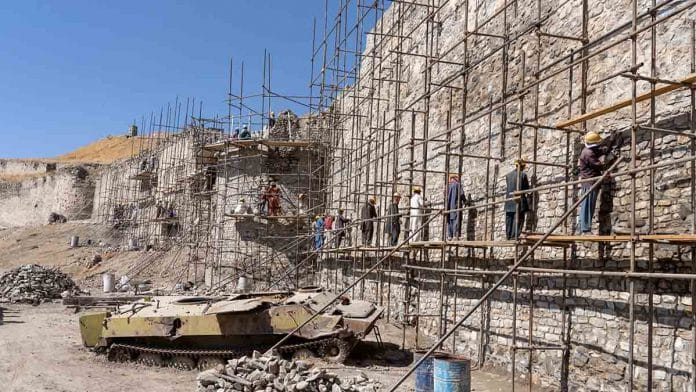New Delhi: Since the Taliban takeover last August, the Indian government has been “unresponsive” on how to proceed with the restoration work of Bala Hissar, an ancient fortress in Kabul, leaving the implementing body of the project to fend for itself, ThePrint has learnt.
In August 2020, India and the then Ashraf Ghani-led Afghanistan government had signed an MoU for restoration of the 65-hectare heritage site, with New Delhi pledging approximately $1 million for Phase-1 of the project. At the time, New Delhi said it was committed to preserving the cultural heritage of Afghanistan.
In November 2020, ThePrint had reported that the project would serve as Afghanistan’s first archaeological park, and was scheduled to be completed by 2022.
However, according to Aga Khan Trust for Culture (AKTC) Afghanistan, which is executing the project, that timeline is now indefinitely stretched due to “reluctance” on the part of the Indian government.
“Since last August, the Indian government appears reluctant to engage with us on how to move forward on the project. They have gone completely off the radar and we’ve been put in the difficult situation of having to resolve a number of issues without their support,” AKTC Afghanistan chief executive officer Ajmal Maiwandi told ThePrint.
“We hope that this situation can be resolved and that the Indian authorities decide to restart its investment in the preservation of Afghan heritage,” he added.
This comes amid reports that the Taliban has said India will resume 20 stalled projects in the war-torn country. In the past, India and Afghanistan had jointly worked on the restoration of Kabul’s Stor Palace, which was inaugurated in 2016.
ThePrint reached out to the Ministry of External Affairs (MEA) for a response about these reports and of AKTC’s claim but it declined to comment.
Also Read: India-Afghanistan ties under strain over Delhi’s silence on students’ visa renewal
‘Germany showing proactive engagement unlike India’
The AKTC, an agency of the larger non-profit Aga Khan Development Network (AKDN), has implemented more than 150 projects in Afghanistan, with two ongoing projects at the Bala Hissar citadel in Kabul and work to prevent the collapse of fifth minaret of Gowharshad’s Mausoleum in Herat.
According to the non-profit organisation, the Indian government’s lack of engagement is in contrast to how other countries, which are also funding projects in Afghanistan, have behaved.
“The Kabul Riverfront Transformation project, another major endeavour, has unfortunately also come to a halt. The German government, which funded the project, decided to suspend it last August but we’ve been in contact with them regularly,” Maiwandi told ThePrint. “They have shown proactive engagement in resolving the multitude of issues related to suspending an active project that employs hundreds of people.”
In August 2018, the German government pledged about $18 million towards the Kabul Riverfront Transformation (KARIT) project.
(Edited by V.S. Chandrasekar)






